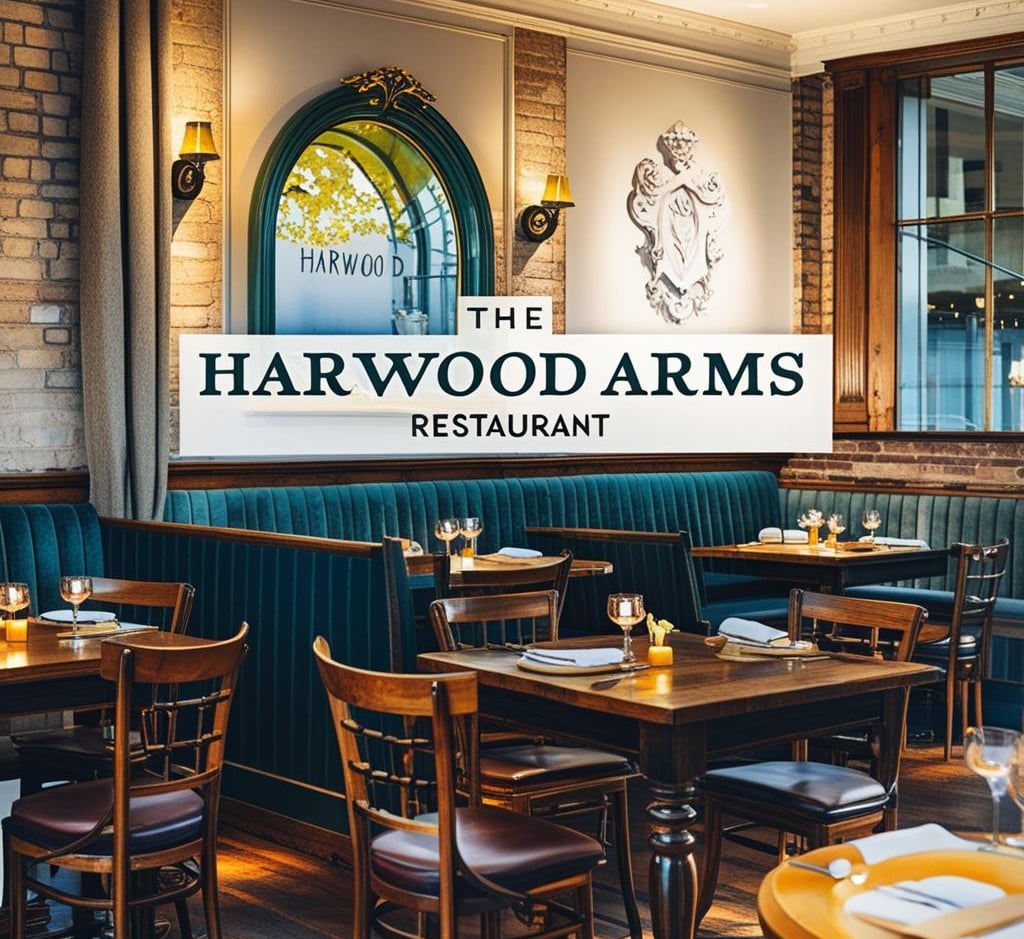The Harwood Arms
Tucked away on a quiet residential street in Fulham, The Harwood Arms performs a remarkable balancing act—maintaining the soul of a traditional British pub while simultaneously holding a Michelin star. The result is perhaps the most honest expression of contemporary British cuisine in London.
BRITISH CUSINE


There's something inherently British about understatement. While French gastronomy announces itself with fanfare and Italian cuisine wears its heart on its sleeve, British food at its finest tends to whisper rather than shout, to suggest rather than declare. The Harwood Arms, London's only Michelin-starred pub, embodies this national characteristic perfectly.
From the outside, you'd never guess you were approaching a culinary destination that has maintained its Michelin star for over a decade. The modest corner building with its dark green exterior and traditional pub signage gives no indication of the gastronomic experiences within. Even the interior, with its wooden tables, bentwood chairs, and understated decor, initially presents as simply a well-maintained local rather than a fine dining establishment.
This deliberate restraint extends to the staff's demeanor. When I visited on a drizzly Tuesday evening, the welcome was warm but unfussy, the service knowledgeable but never pretentious. My server, Emma, struck that perfect note between professional and conversational, guiding me through the menu with genuine enthusiasm rather than rehearsed descriptions.
"First time with us?" she asked after I'd settled at a corner table with a half-pint of Sambrook's Wandle, a local ale with biscuity notes that complemented the bread basket that had arrived moments earlier.
When I confirmed it was indeed my first visit, she smiled. "The venison Scotch egg is non-negotiable for first-timers, I'm afraid. House rules."
It was a recommendation I was happy to accept, having heard about this signature appetizer from several London food enthusiasts. While Scotch eggs (hard-boiled eggs wrapped in sausage meat, breaded and fried) have long been a staple of British pub fare, The Harwood Arms' version elevates the form to something extraordinary.
When it arrived, presented simply on a wooden board with a small pot of mustard, the first thing I noticed was its perfect spherical form—no mean feat when working with ingredients that resist such geometric precision. Cutting into it revealed the game-changing detail: the egg inside was soft-boiled rather than hard, its yolk still luxuriously runny, creating a natural sauce that enriched every bite.
The venison meat surrounding the egg was coarsely ground, intensely flavored, and expertly seasoned, with subtle notes of juniper and black pepper complementing rather than overwhelming the natural gaminess. The breadcrumb coating provided essential textural contrast, golden and crisp without being greasy.
"We go through about 200 of these on a busy day," Emma informed me as she noted my clear enjoyment of the dish. "The recipe hasn't changed since Brett Graham and Mike Robinson opened the place in 2009."
This combination—unchanging excellence in signature dishes alongside seasonal creativity in the main menu—defines The Harwood Arms' approach. The core identity remains consistent while the surrounding expressions evolve with the seasons and the chef's inspiration.
This philosophy became even more apparent with my starter proper: a salad of wood pigeon, pickled walnuts, and smoked bacon. The pigeon breast, served a perfect medium-rare, offered that distinctive mineral richness that makes game birds so compelling. Pickled walnuts, an old-school British preserve rarely seen on contemporary menus, provided acidic contrast and historical resonance. The smoked bacon added depth and salinity, while a light dressing of sherry vinaigrette unified the components.
What impressed me most was the technical restraint evident in the dish. The pigeon had been cooked precisely to that narrow window where game birds express their full flavor while remaining tender. The various elements on the plate were thoughtfully combined but not forced into unnatural fusion. Each component maintained its integrity while contributing to a harmonious whole.
This approach—respectful of both ingredients and tradition while unafraid of refinement—runs throughout The Harwood Arms' menu. It represents a particularly British form of culinary evolution, one that doesn't reject the past in pursuit of novelty but rather builds upon historical foundations with contemporary technique and sensibility.
The restaurant's connection to the British countryside extends beyond its menu to its ownership and sourcing practices. Co-owner Mike Robinson is a renowned deer manager and hunter who supplies much of the venison served at the restaurant. This direct involvement in the sourcing chain isn't merely a marketing stance but a fundamental aspect of the establishment's ethos—a commitment to understanding the complete journey from field to plate.
For my main course, I chose the day's special: fallow deer with celeriac, pickled quince, and kale. The venison, predictably, was the star—two generous cuts, one from the loin and one from the haunch, each with its distinct character but both expressing that unique sweetness that properly sourced deer offers. The meat had been carefully hung to develop its flavor, then cooked with precision that respected its lean nature while achieving perfect doneness.
The accompaniments demonstrated the kitchen's understanding of traditional British flavor combinations while subtly updating them. Celeriac appeared in two forms: as a silky purée and as crisp chips, providing textural diversity while maintaining thematic consistency. The pickled quince offered the crucial acidic note that game dishes require, while Ironbark pumpkin and cavolo nero anchored the plate in seasonal context.
What struck me throughout the meal was how The Harwood Arms has defined a style of cooking that feels authentically British without either the insecurity of international fusion or the restrictive dogma of purely historical recreation. This is confident, mature cuisine that knows exactly what it's doing and why.
Wine service merits special mention. Rather than an intimidating tome, the wine list is concise, thoughtful, and designed to complement the food rather than overwhelm it. My server recommended a glass of Fleurie, its bright acidity and soft tannins a perfect foil for the venison's richness. When I engaged her in conversation about the selection, her knowledge was impressive without being showy—another example of that distinctly British combination of expertise and understatement.
Dessert continued the theme of refined simplicity. I chose the blackberry and hazelnut cake with yogurt sorbet—a composition that balanced sweetness, nuttiness, and acidity with remarkable precision. The cake itself had that elusive quality that defines great British baking: substantial without being heavy, flavorful without being overwhelming, comforting without being merely nostalgic.
The yogurt sorbet performed the crucial role of preventing the dessert from becoming too rich, its subtle tartness refreshing the palate between bites. A garnish of fresh blackberries provided bursts of intense flavor, while a discreet drizzle of honey added complexity and floral notes.
Throughout the meal, I observed my fellow diners with interest. The crowd was notably diverse—local residents enjoying a weeknight dinner, food enthusiasts who had clearly made a special journey, even a table of well-known chefs engaged in animated conversation over multiple bottles of wine. The atmosphere remained genuinely pub-like despite the sophisticated food, with conversation flowing freely between tables and a pleasant buzz of conviviality filling the space.
This, perhaps, is The Harwood Arms' greatest achievement—maintaining authentic pub character while serving food of remarkable quality. Where many establishments would have evolved into restaurants that happen to occupy former pub buildings, The Harwood Arms remains fundamentally a pub, albeit one with extraordinary culinary credentials.
This distinction matters. Pubs hold a central place in British culture that restaurants, however excellent, cannot replace. They are social institutions as much as dining establishments, places where community forms and expresses itself. By preserving this essential pub character while elevating the food to Michelin standard, The Harwood Arms serves as both cultural guardian and culinary innovator.
The bill, when it arrived, reflected this dual identity. While certainly not inexpensive (quality ingredients properly sourced and skillfully prepared come at a cost), the pricing felt fair for the experience provided. A comparable meal in a more formally structured restaurant would likely have cost significantly more, without the relaxed ambiance that enhanced the evening.
As I prepared to leave, I noticed chef Sally Abé briefly emerging from the kitchen to chat with regular customers at a corner table. This small interaction exemplified The Harwood Arms' approach—professional but personal, serious about food but not solemn about dining, respectful of traditional British hospitality while embracing contemporary culinary standards.
Walking out into the drizzly London evening, I reflected on what makes The Harwood Arms so special in London's crowded dining landscape. It's not merely the quality of the cooking, impressive though that is. Nor is it the achievement of maintaining a Michelin star within a pub context, remarkable as that may be.
What distinguishes The Harwood Arms is how it embodies a particular moment in British food culture—a moment when historical traditions and contemporary techniques have achieved perfect balance, when confidence has replaced both the insecurity and pomposity that have sometimes characterized British cuisine, when an establishment can be simultaneously accessible and excellent.
For visitors seeking to understand contemporary British food at its best, The Harwood Arms offers something more valuable than a mere meal. It provides a window into how British cuisine has evolved while maintaining its soul, how it has embraced refinement without surrendering character, how it has found its own voice within the global culinary conversation.
In a city filled with impressive restaurants representing culinary traditions from around the world, The Harwood Arms stands as a quiet but compelling assertion that British food, when approached with knowledge, skill, and respect, deserves its place among the world's great cuisines. And it makes this assertion not with grandiose claims or theatrical presentation, but with something far more convincing: consistently delicious food served in a genuinely convivial setting.
That, perhaps, is the most British approach of all.
Location


Address
Walham Grove, Fulham, London SW6 1QP
Get in touch


